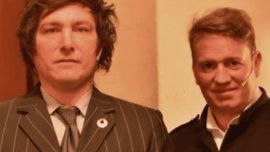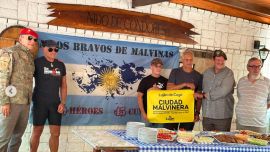In Argentina at the moment, one news story dominates them all. The disappearance of Santiago Maldonado – the 28-year-old artisan who has been missing since August 1 – is the highest agenda on every news bulletin and frontpage, creating column inches at will from journalists, op-ed writers and analysts. But still, more than a month after he disappeared, Maldonado’s whereabouts are no closer to becoming known. Last week, tens of thousands took to the streets across the country as demonstrators congregated in public squares -including the famous Plaza de Mayo in the nation's capital- to demand an answer to the question on everyone's lips: 'Where's Santiago Maldonado?'
This transcends the issue of political affiliation,” said demonstrator Aepa Espinoza, 45, accompanied by his wife and two small children who held up a picture of Maldonado. “This case shows that there are deep divisions in the country because we should all be here.”
After more than a month of apparent inaction and fierce criticism from human rights organisations both local and international, President Mauricio Macri this week reacted to the demonstration by intervening directly in the case. The massive march in front of Government House – which was followed by violent clashes between protesters and the police – and the lack of progress in the investigation into Maldonado’s disappearance forced Macri’s hand, pushing the federal government to launch a parallel inquiry.
“We are working and collaborating with the justice department,” Macri told reporters on Tuesday, in one of his first public statements on the case.
“We have to be cautious, we cannot make judgments ahead of time, we must allow the judge to move forward with absolute freedom,” the president reiterated the following day.
Disappearance. Maldonado is believed to have been present at a protest on August 1 supporting the claims of the Mapuche indigenous group in the vicinity of Cushamen, in the Patagonian province of Chubut. The Mapuches, who claim land there as their own, arguing it forms part of their ancestral grounds, were protesting at the billionaire Benetton family’s ownership of vast swathes of territory. Benetton is the largest private landowner in Argentina, with territory totalling more 800,000 hectares.
The Mapuche demonstration was eventually cleared, forcibly dispersed by the Gendarmerie (Border Guards) after blocking National Road No. 40 and since then, Maldonado hasn’t been seen. The Mapuches claim Maldonado was beaten and taken away by the Gendarmerie and some have alleged that he died while in the custody of the security forces.
Until last Friday’s march, Security Minister Patricia Bullrich was the government’s official word on the case. Stubbornly defending the Gendarmerie, Bullrich drew the ire of the human rights community and Maldonado’s immediate family.
Tensions boiled over in the violent clashes that preceded the official act last Friday where Maldonado’s brother criticised the government and asked for Bullrich’s resignation. More than 30 people were arrested, while 17 people suffered injuries, nine of them police officers.
Macri’s new parallel investigation is headed by Justice Minister German Garavano and Human Rights Secretary Claudio Avruj. While Federal Judge Guido Otranto and prosecutor Silvia Avila haven’t called on any Border Guard officers to testify, Garavano’s team has interrogated some 40 officers that were present at the August 1 operation, but to no avail. “The strongest hypothesis points toward the Gendarmerie,” Avruj noted this week, “but we have no concrete evidence.”
Another hypothesis suggested Maldonado could have been wounded in a knife fight with Evaristo Jones, a property caretaker for the Benetton lands who was ambushed by four masked members of the radical RAM (Resistencia Ancestral Mapuche) group in the early hours of July 21. Jones reportedly stabbed one of the intruders and some suggested that Maldonado may have been severely injured in the incident, yet official DNA tests by the investigators concluded the blood was not Maldonado’s.
Agenda. The case has taken over the agenda, dominating both social media and traditional news outlets. False rumours including pictures of a supposed body with stab wounds went viral on social networks. Another rumour suggested that Maldonado’s body had been found in Chile — another line of investigation being pursued by the government — but the story was quickly discredited by Interpol.
Former president Cristina Fernández de Kirchner was quick to pin the blame on the government this week and, specifically, on Security Minister Bullrich. “Why is she lying? Who is she protecting?” she asked on social media, adding that the Jones’ stabbing hypothesis was a “planted version by the government given creed by the mainstream media.”
It wasn’t just CFK that questioned the government’s continued support for the Gendarmerie. Federal prosecutor Federico Delgado began his own investigation into an alleged cover-up by the federal government and the Gendarmerie of Maldonado’s disappearance.
The complaint puts Cabinet Chief Marcos Peña, Human Rights Secretary Avruj, and Security Ministry Cabinet Chief Pablo Nocetti at the centre of the case, while asking for Judge Otranto to be removed from the case.
“We are living amidst crumbling institutions, the State appears incapable of solving conflicts which leads to political violence,” Delgado said in a radio interview, “it seems as if no one is trying to objectively determine what happened.”
Meanwhile, international coverage of the story has raised its profile as human rights organisations demand more action. The UN High Commissioner for Human Rights expressed concerned about the lack of progress in the investigation last week, with the head of the body’s regional office for South America urging the government to follow “international human rights standards.”
There are clear “parameters for conducting an investigation into these types of events, especially when there are possible indications of the involvement of security forces,” said Amerigo Incalcaterra, head of the commission’s office for South America.
Last week at the demonstration, the missing man’s brother, Sergio Maldonado called on Bullrich to step down, saying the administration had failed in its attempt to find his sibling.
“One month after Santiago’s forced disappearance, the state continues to deny it. The only people they have questioned are his friends and family,” Sergio Maldonado complained.
Meanwhile, the investigative attempts move forward. On Friday, Judge Otranto ordered federal forces to comb the areas near the shore of the Chubut river, across which the Mapuche protesters retreated on August 1 as they escaped the Gendarmerie. An initial investigation with canine units followed what appeared to be Maldonado’s trail to the river’s shores, yet Otranto refrained from ordering a thorough search of the “sacred lands” the Mapuches control on the other side.
After 40 days without traces of Maldonado, his disappearance is increasingly a political affair that threatens the social stability the government thought it had achieved after the electoral outcomes of the recent PASO primaries.
Meanwhile, a country continues to ask for an answer to its question: ‘Where is Santiago Maldonado?’
























Comments